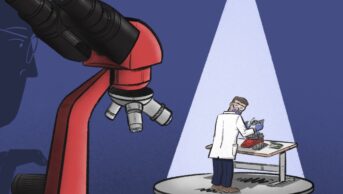
Shutterstock.com
That the wheels of government can grind agonisingly slowly comes as no surprise, but 10 years to achieve a relatively straightforward change to an anachronistic law that criminalised honest dispensing errors by pharmacists is a long time by anyone’s standards.
The Pharmaceutical Journal
reported on 16 December 2006 that the Royal Pharmaceutical Society’s Council had agreed to start the process of “decriminalising dispensing and labelling errors to make it easier to treat them as learning opportunities”.
Almost 10 years later, on 14 November 2017, pharmacy minister Steve Brine welcomed the introduction before Parliament of dispensing errors draft decriminalisation legislation that would “improve the reporting of incidents, increase transparency and allow lessons to be learned”.
Despite agitation from across the pharmacy profession, and at least two unfortunate pharmacists being handed suspended prison sentences for making honest mistakes, the excuses for not decriminalising dispensing errors over the past decade have been many and the developments very few.
What makes this slow progress even less understandable is that until now, unless a patient died as the result of gross negligence, no other healthcare profession would have been exposed to prosecution in the same way as pharmacists for making an honest mistake while doing their job.
One of the key sticking points identified for the delay in producing legislation was the requirement for approval from all four UK governments — at a time when the Northern Ireland Assembly was not fully operational, Scotland faced a referendum on its secession from the UK, and the entire political class across the UK was distracted by Brexit.
But there is no obvious reason why any of the UK governments would have raised serious objections to a change in the law which only brings community pharmacists, pharmacy technicians, and pharmacy staff into line with other healthcare professions.
The introduction of the draft legislation has been welcomed by almost every senior figure in the pharmacy profession, as one might expect, and the next step is to make sure the law changes to protect all pharmacists, not just those working in community pharmacies.
RPS president Ash Soni has described this new fault line between two sectors of the profession as “intolerable”, but there is real hope that progress towards legislation that will cover the whole pharmacy profession will be speedier this time.
Who knows what the political future may hold, but the fact that agreement on the principle of protecting pharmacists who make honest dispensing errors has been secured in England, Scotland, Wales and Northern Ireland, provides hope that extension of the legislation could be relatively quick.
Indeed, there is hope that consultation paperwork on providing a legal defence for all other pharmacists may appear as soon as the early part of 2018.
Having said that, it took the best part of three years for a governmental consultation paper on decriminalising dispensing errors, published in February 2015, to result in the draft legislation which finally reached Parliament this month. So perhaps it’s best not to hold one’s breath.
You may also be interested in

What are the views of the RPS and Pharmaceutical Press on AI training using copyrighted materials?

Government should consider ways to prevent ‘inappropriate overseas prescribing’ of hormone drugs, review recommends
